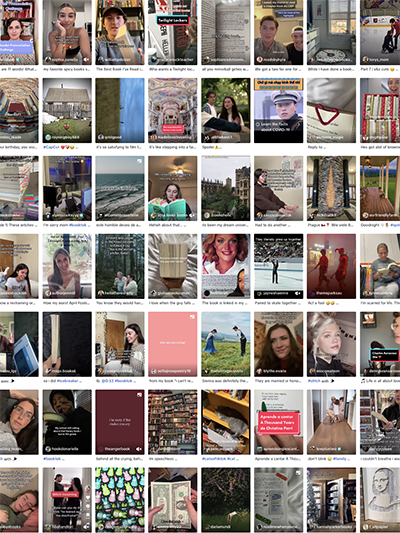KEYNOTE LECTURE
Reader Studies in the Digital Age: Community, Diversity, and the Data of Literary Consumption
April 5–7, 2024
Symposium presented by Penn's Price Lab for Digital Humanities and co-organized with the Section for Sociology of Literature, Uppsala University
During the global lockdowns triggered by the COVID-19 pandemic, mainstream media users began to learn about a new bookish community of avid readers congregating on the social-media platform TikTok. BookTok, as the subcommunity labeled itself, comprises enthusiastic readers who share brief videos about their reading experiences, compile book recommendations, and intervene in assorted literary debates. Likely because the dominant bookTok demographic is teenage girls and twenty-something women — a long-stigmatized readerly constituency — the literary academy has paid the phenomenon scant attention. When it does deign to notice how bookTok is creating overnight bestsellers out of often backlist titles, the general tone is one of weary cynicism or outright disparagement. This is especially so regarding the bestknown bookTok subgenre #booksThatMadeMeCry, in which readers film their intense emotional reactions to fictional narratives: crying; sobbing; shaking; and occasionally scribbling on a volume or hurling it across the room to give vent to excess readerly affect.
Curiously, academic dismissal of bookTok is occurring during the same period that literary studies has been reconsidering the discipline’s foundational banishment of readerly affect as too subjective and impressionistic to ground a rigorous academic discipline. Having long valorized cerebral detachment over embodied emotion, literary studies now finds itself attempting to chart a path out of the ideology critique that has dominated the discipline for the last half century, with its default stance of suspicion and emotional aridity.
The keynote address will analyze how bookTokers inventively demonstrate their love for the printed codex via the affordances of one particular digital platform. These performances of bibliophilia are at once saturated with personal emotion and at the same time readily instrumentalized by the TikTok platofrm for commercial advantage. In a further twist, bookTokers are intensely aware of this fact, and deploy cooptation, irony and self-satire as they attempt to forge readerly community on a platform governed by an unknowable, all-powerful algorithm with hazy links to foreign powers. Given such a dynamic and contested environment, we need to move beyond the academy’s longstanding preoccupation with what affect is, and ask instead what affect does in the digital literary sphere.
The keynote address unpacks a fascinating contemporary case-study while also asking more searching, discipline-wide questions about how literary studies can productively reconceptualize the ever-thorny problem of affect.
Keynote cosponsored by Penn's Department of English, Comparative Literature Theorizing Series, and Wolf Humanities Center.
 Simone Murray is Associate Professor in Literary Studies at Monash University, Melbourne and an elected Fellow of the Australian Academy of the Humanites. She is author of four books: Mixed Media: Feminist Presses and Publishing Politcs (Pluto Press, 2004); The Adaptation Industry: The Cultural Economy of Contemporary Literary Adaptation (Routledge US, 2012); The Digital Literary Sphere: Reading, Writing, and Selling Books in the Internet Era (Johns Hopkins UP, 2018); and Introduction to Contemporary Print Culture: Books as Media (Routledge UK (2021). She is currently finalizing a new monograph, Literary Media Studies: The Digital Future of English, from which the presentation is drawn.
Simone Murray is Associate Professor in Literary Studies at Monash University, Melbourne and an elected Fellow of the Australian Academy of the Humanites. She is author of four books: Mixed Media: Feminist Presses and Publishing Politcs (Pluto Press, 2004); The Adaptation Industry: The Cultural Economy of Contemporary Literary Adaptation (Routledge US, 2012); The Digital Literary Sphere: Reading, Writing, and Selling Books in the Internet Era (Johns Hopkins UP, 2018); and Introduction to Contemporary Print Culture: Books as Media (Routledge UK (2021). She is currently finalizing a new monograph, Literary Media Studies: The Digital Future of English, from which the presentation is drawn.



